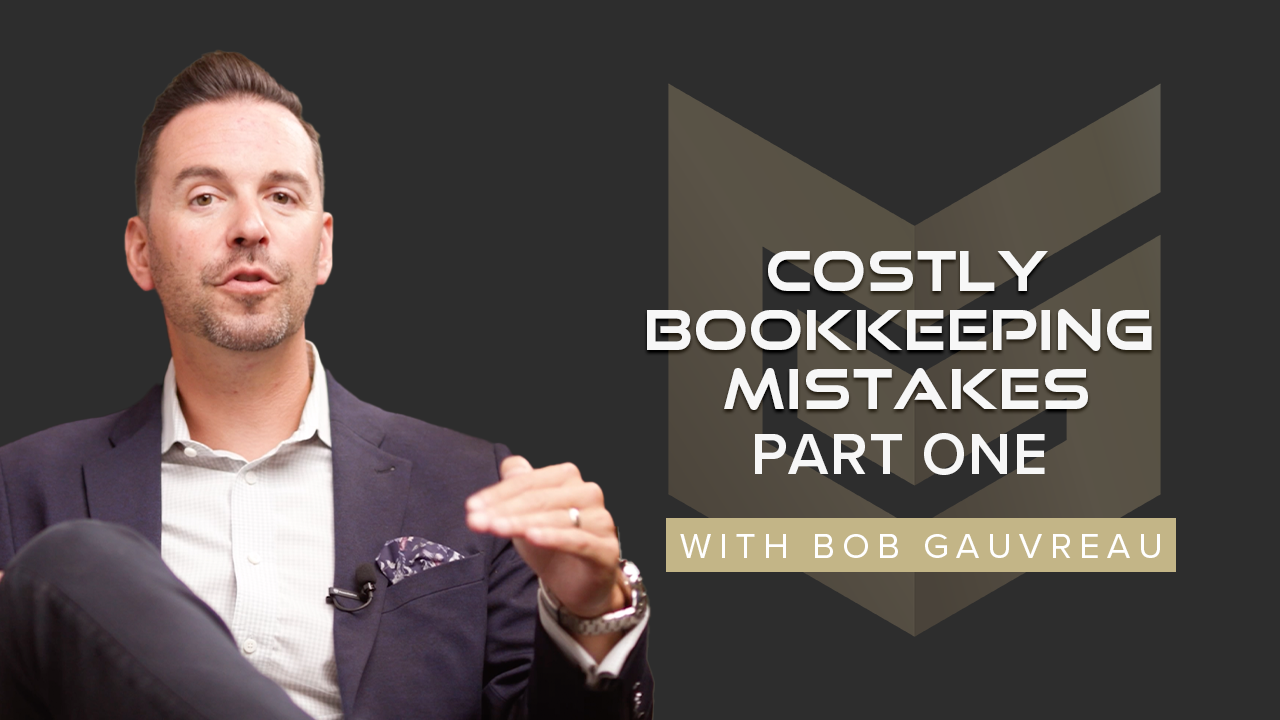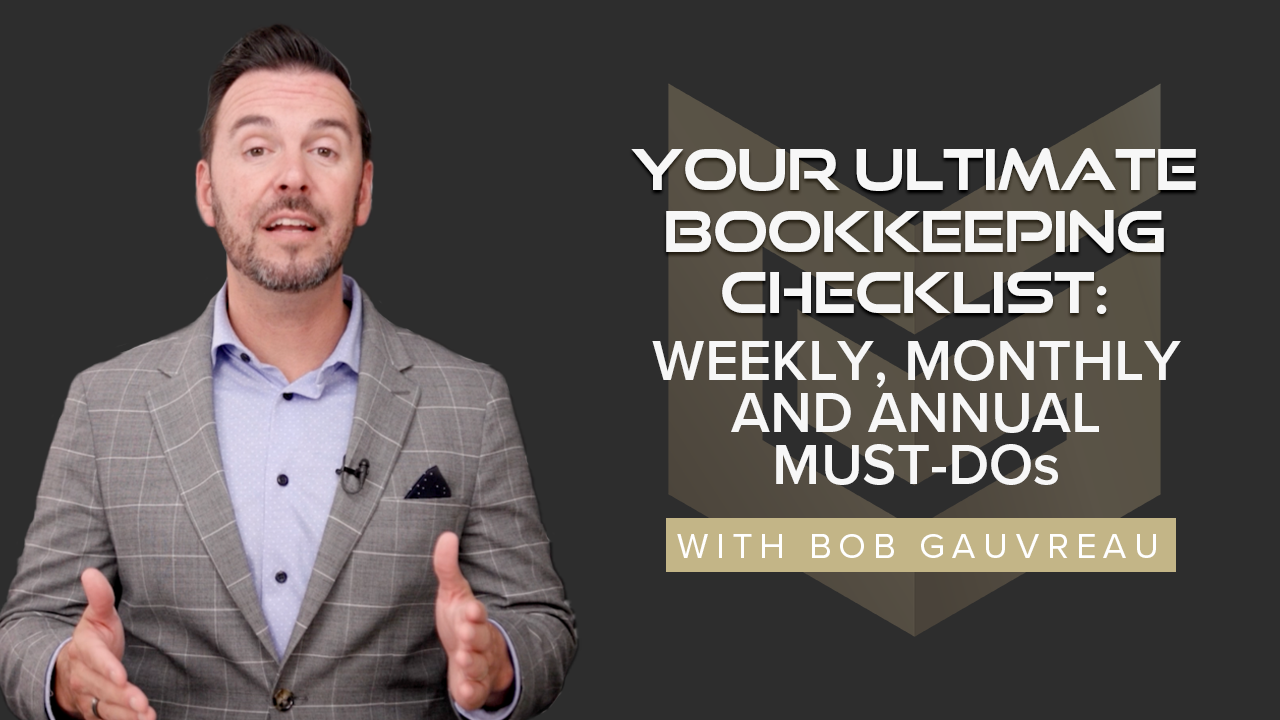Taking Control of Your Business Finances: A Monthly Reporting Roadmap
Are you eager to take control of your business's financial health? Well, you're in the right place. In this blog post, we're diving into...
9 min read
 Gauvreau Accounting Tax Law Advisory
Aug 8, 2023
Gauvreau Accounting Tax Law Advisory
Aug 8, 2023
We're going to talk about the 12 costly bookkeeping mistakes business owners make.
Mistake number one: Failing to separate personal and business finances. Often, what happens is business owners get involved in their business, they get started, they only have one bank account, and they're pulling personal funds out. Ultimately, the business is being financially supported by them putting money in, and they're also being supported by pulling financial money out. We have to ensure that there's complete separation. Otherwise, we don't really understand which expenses are business-related and which are personal-related. We need to understand what business expenses are in there so that we can see how the business is performing. We do not want to have a conglomerate of personal and business. It has to be separated if you want good financial information.
Mistake number two: Failing to keep accurate records. I talk a lot about Profit Simple and our idea of Profit Simple is based on three main principles: being up-to-date (one), being accurate (number two), and being reliable and understanding what it means (number three). The accuracy of your financial information is incredibly important. In fact, it might be one of the most important things within our business. These insights relate to how our business is performing, and we make decisions based on the accuracy and relevance of that information. If your information isn't accurate, you're making decisions based on false information, which could be highly misleading and guide your business down the wrong path. Accurate information gives you the confidence and the empowerment to make informed decisions.
Mistake number three: Failing to reconcile your accounts. A reconciliation process is essentially the verification that the information entered into your bookkeeping software is accurate and checked. It's our way of validating the information. Reconciliation ensures that all the transactions that go through, for example, a credit card, actually happened. Sometimes duplicate entries occur, and reconciliation helps us identify them. Additionally, we record entries throughout the month that should show up on our statements. If they don't, we can identify the discrepancy. A reconciliation process validates the information that's in there and highlights missing information. This is our check to ensure the accuracy of your bookkeeping, and we can rely on this information going forward.
Mistake number four: Not classifying expenses properly or misclassifying them according to the category. So why is this important? Well, when we understand how our business operates, there's really two categories of expenses. One is a cost of goods sold, a variable cost, a direct cost that we encourage those costs as part of delivering our revenue. The other side is we've got fixed expenses, which is more of an overhead. It doesn't necessarily go up and down based on our revenue volume, so we've got two different categories of expenses. If we misclassify these, we don't actually know how much our profitability is on every dollar of revenue or every job and that is one of the greatest driving forces of understanding how your business is performing, is to understand the profit margins that go into your business and what you're actually earning for every single job. If we misclassify, we may not find issues and errors throughout the year. If we misclassify an expense, let's call it a meals and entertainment expense. If it's actually a travel and it goes into meals and entertainment, you could end up losing tax deductibility related to it as well. So your visibility on profit margins goes away, and your ability to deduct everything fully for tax purposes could also be an issue. Misclassifying is definitely an inaccurate way of reporting and we want to make sure that we eliminate that because accurate numbers help enable us to make informed decisions.
Mistake number five: Failing to track accounts receivable appropriately. One of the last things we want to do as a business owner is provide a product or service that we should be charging and not actually collecting that money. So one of the challenges we see in business owners, especially in small business, is if we're not invoicing at the time of delivery, then we could be essentially missing out on revenue opportunities. I see it happen all the time, especially in the contractor world or the service space world. We do a service, we complete a service like let's say we're repairing a doorway. Somebody call us in to do a quick job. It's maybe $200 and we go on to the next job and we never actually invoice it. We need to make sure that we have a system in place that helps us one track that all of our revenue is getting billed out. And number two, what revenue is being billed out is actually being followed up upon. We can't have a bookkeeping system that has handwritten notes of who owes us money because we're going to miss things and it's going to ultimately lead to lack of profitability and lack of cash flow in our business, which is not a good outcome. So let's make sure that if we're doing a service or we're selling a product that we're tracking who owes us money and we're following up consistently to make sure that that cash gets in our bank account.
Mistake number six: Failing to track accounts payable properly. This is an issue in a lot of small businesses. When you think of being on a cash basis or an accrual basis, a cash basis means transactions are being recorded when they actually take place. An accrual basis means transactions are being reported when the activity related to them actually takes place. So for example, if I buy something from one of my suppliers, let's say I'm buying some lumber, but I don't actually pay them cash, I want to record that at the time that transaction happens or that activity happens. So I'm expensing that in the right period. First off, tracking accounts payable properly will help make sure that our matching expenses and revenue are in the same period. Give us great insights over our profitability. And second, it will make sure that we don't have any surprises, that we owe people money because sometimes our suppliers forget to send us an invoice until three or four or five months out, which maybe we forget about it and then if we have a ten or $20,000 invoice come in at that time, we're a little bit surprised and maybe not proactively planning for it. So we want to incur accounts payable and record accounts payable as they're incurred versus when we're just paying items. Accounts payable are key in making sure that we're reporting effective numbers to make informed decisions.
Mistake number seven: Failing to plan for taxes. This is probably one of the biggest areas that I see issue. I'm an accountant, I deal with the tax filing, but a lot of business owners just want to deal with taxes after the year is over. Instead, what we should be doing as a business owner is proactively planning what our tax liabilities look like. So let's say, for example, our tax rate is going to be 20%. If we've made $100,000 in the first six months of the year. We should be planning out that we have a $20,000 tax liability at that point in time. If we're not sure what our tax rate is, reach out to those that actually know because we don't want a huge surprise at the end of the year that we owe $40,000 when we thought maybe it was going to be ten. Always applying the ideas of understanding what your tax liability is going to be will help eliminate those surprises and help you proactively plan your cash outflow resources.
Mistake number eight: Not understanding payroll taxes. Now, as a business owner, we've got multiple ways that we can pay ourselves really two. One is to put ourselves on payroll. And two is to pay ourselves as a shareholder. Now, there's a difference between the two. And part of the understanding is what payroll taxes actually mean. So when we're paying ourselves on payroll, there's required deductions that come off. If we're in Canada, it's Canada pension plan, employment insurance, potentially. But income tax withholdings in the US, it's very similar. You've got pension contributions that need to go in. You've got employment insurance that comes off. So ultimately you get a net paycheck. All of those deductions have to be remitted to the government. So if we're not tracking those properly or if we're not understanding the mechanism that triggers when we have to pay these, like a lot of businesses have to pay this monthly. We need to remit that amount to the government on a monthly basis. This could be costly from a cash flow standpoint. It can also be costly from having to contribute these expenses throughout the year. So we want to understand, one, what those payroll liabilities are if we're on payroll. But to understand that there's other ways that we can compensate ourselves that maybe doesn't involve payroll liabilities so that we can get money out a little bit more efficient from a cash flow and from a tax basis. So make sure you understand what those payroll liabilities are and when they become due.
Mistake number nine: Overlooking tax deductions and other available credits. One of the pieces that's really important in good bookkeeping is tracking some of those items that maybe should be expensed or maybe shouldn't. And we really want to focus on the deductibility of all items. One area where there's bookkeeping mistakes is that anything that has an appearance of personal nature, whether it's maybe an Amazon purchase or it's a coffee shop purchase, something like that might end up going through a shareholder or an owner's drawer count, which ultimately makes it not deductible for business purposes and likely taxable to the individual for pulling those moneys out. If your bookkeeping is not accurate, you miss out on opportunities to have those items deductible inside your business and you end up paying not only more business tax but more personal tax related to those. At the same token, the classification of these categories is very important as well, because if you classify an item or an expense that's in a category that's not deductible for tax purposes, you miss out on those opportunities as well. So we want to make sure that all of those expenses are being put in maximized deductibility so that we can pay the tax man a little less money.
Mistake number ten: Failing to budget. This is probably the greatest tool that you can use in your business if you don't know where you're headed. How do you know how you're going to get there? If you do not have expectations or goals inside your business of what you're going to earn from revenue, what that profit margin on that revenue is and what your overhead expenses are, how do you know how much funds you can allocate and how you're going to continue to track your level of success?nBudgeting is a framework and a benchmark for you to track and essentially reflect on the progress your business is making and see if you're still on track to achieving your goals. Again, if you don't know where you're headed, if you don't have an expectation, how do you know if you're winning the game or if you're heading in the right direction? So we want to make sure for every small business that you have a budget expectation of what you want to accomplish, the financial outcomes of that in your business so that we can track the progress and see that you're on track to success.
Mistake number eleven: Not reviewing financial statements regularly. This would be one of the biggest problems I see with businesses. One, we have to make sure that the information is up to date and it's accurate it. But when that information is in there, it is so powerful for a business owner, for business owners to have all of the financial data that shows how the business is performing. Empowers you with all the information you need to make informed decisions. In fact, it should give you extra confidence knowing what decisions you need to make in your business because of the history of what's been happening. If your business is profitable, you need to make those same decisions to say, Hey, how do we recreate this? How do you know if your business is profitable? If you're not reviewing your financial statements, it gives you the power, one of knowing how the business is doing. But to the power of understanding the progress you continue to make because progress keeps us in momentum. It actually helps from a psychology standpoint, helps us stay happy as well. Progress makes people happy. So make sure you're reviewing, make sure you're looking back to see how your business is performing, but to how much progress you're making. It'll make you feel in momentum and it will continue to boost the productivity of your business and maximize the financial performance.
Mistake number twelve: Not leveraging technology effectively. Listen, we're in a time of increased technology and advancement. We now know that there's cloud accounting solutions in there that can support your business on a daily basis. We can actually bring in data on a live basis. So all of your transactions are coming in daily. This empowerment allows you to have access to so much financial information on your fingertips that you're going to be able to make all the informed decisions you need. All of the information you need is accessible all through the use of good new technology. We're huge fans of QuickBooks Online we're a great partner with QuickBooks. They are the most advanced technology that you can get related to bookkeeping. They're the number one company in the market. They're a cloud based solution that, again, allows you to be up to date and live on a daily basis. It pulls all your transactions in and allows you to have the power of that information all in front of you. So if you want to have up to date accurate, reliable information to make informed decisions. Utilize and leverage technology to make your life easier and to give you access to that data so you can make those informed decisions.
Bonus: Seeking professional guidance when needed. I just want to talk about the importance of seeking professional guidance when needed. So recently we just brought a new client on. They've been working with a bookkeeper for the last couple of years, but they have not been getting the financial information and the financial statements on a monthly basis. And unfortunately, that business owner, when they came to us, we noticed that they were actually really struggling. They knew that they were running short on cash frequently, but they didn't understand why. So within moments, we were able to analyze their financial information and realize that their pricing strategy needed to change. They weren't charging enough for their services. Not only weren't they at market value, but they were essentially pricing themselves out where they couldn't actually make money. That business owner had to make that change. They did. So it didn't impact any of the satisfaction related to their clients. It just adjusted some of the new pricing that they had to implement in their business and now that business is thriving.
Consulting experts, like the team at Gauvreau, ensures accurate financial information interpretation. Professionals identify opportunities, address challenges, and facilitate strategic financial decisions. Seeking guidance ensures accurate, insightful financial management, leading to enhanced profitability and financial freedom.

Are you eager to take control of your business's financial health? Well, you're in the right place. In this blog post, we're diving into...

Proper bookkeeping is essential for the success of any small business, yet many entrepreneurs make costly mistakes that can negatively...

Keeping up with your bookkeeping is one of the most important responsibilities you have as a business owner. It’s not just about staying...